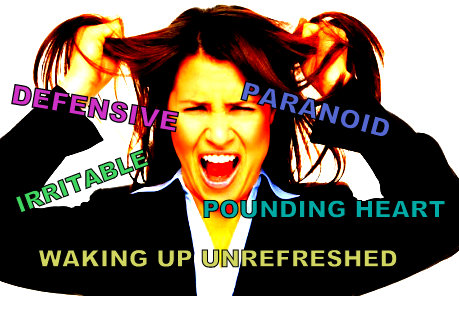The following STTM copyrighted list of adrenal / low cortisol symptoms is a compilation experienced and reported by patients within known adrenal issues in groups associated with Stop the Thyroid Madness. Most of these are related to low cortisol, but some can be experienced with high. Janie, hypothyroid patient and site creator
These symptoms can also be found or exacerbated while raising natural desiccated thyroid or T3. They can occur at low doses of desiccated thyroid or T3. Or they can wait to occur when a patient gets as high as 3 grains and more. That’s why it is SO important to test ahead of time before raising NDT or T3.
They are in no particular order, and you can have some and not others:
Summary:
• continuing hypothyroid symptoms with a high free T3
• shaky hands; shakiness
• diarrhea
• bad palps
• higher heart rate
• pounding heart
• feeling of panic
• weakness
• inability to handle stress
• inability to handle interactions with others
• inability to focus
• rage or sudden angry outbursts
• emotionally hyper sensitive
• overreacting
• highly defensive
• feeling paranoid about people or things
• exacerbated reactions to daily stress
• no patience
• easily irritated
• mild to severe hypoglycemic episodes
• nausea in the face of stress
• taking days to recover from even minor stress
• taking days to recover from a dental visit
• flu-like symptoms
• headache
• all over body ache
• super-sensitive skin• extreme fatigue
• scalp ache
• hyper feeling
• jittery
• clumsy (drop things, bump into things)• confusion
• suddenly feel extremely hungry
• low back pain
• dull cloud-filled head (happens when patient is due for a next cortisol dose)
• jumpiness
• muscle weakness
• “air hunger” similar to hypo
• dizziness
• light headedness
• motion sickness
• coffee putting patient to sleep
• vomiting even running up the slightest incline
• almost passing out every time patient gets up
• dark circles under my eyes
• waking up in the middle of the night for several hours
• difficulty falling asleep
• frequent urination
• IBS symptoms
• worsening allergies
If you have any of the above, it is highly recommended by informed patients that you confirm sluggish adrenals with the Discovery Steps found on the Adrenal-info page or Chapter Five in the revised STTM book with more in the list.
To finally confirm a cortisol problem, we do the saliva cortisol test, NOT blood–the latter which is testing mostly bound cortisol. Then we compare the results to this page.
The ACTH STIM may be good to detect if you have a pituitary problem, but may fail you to detect the kind of adrenal dysfunction that many hypothyroid patients have. It’s also recommended that you try to find a doctor who will be open minded about adrenal treatment.
Thank you to those who have the ethics NOT to use STTM material as if it’s your own. This information is copyrighted.


